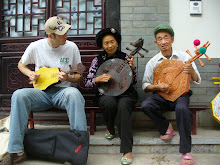Laoyang moved The Sugar Jar, his “experimental/noise” record store, to 798 back when it was nothing but a few subversive art galleries on the edge of town. Since then the place has been almost Disney-fied, but The Sugar Jar itself remains the same, a Zen-like space that discretely harbors more noise than you’ll find anywhere else in China. On a rainy night last weekend, he agreed to meet with me at a nearby cafe to talk about my research. My first impression was that the man personifies his business. Dressed in a leather jacket, collar pulled up to his ears, heaps of scarves and a goatee, right off the bat, in a soft, breathy voice, he said some things about the government that left even me, a foreigner, feeling slightly defensive.
Before opening the store, Laoyang dropped out of high school and worked odd jobs as a construction worker, a janitor and a hawker before getting his hands on some no-wave albums and deciding that there was "more to life than this." He’s come to believe that music itself has come full circle -- that the most cutting edge experimental artists on his shelves are only now attempting to capture the powerful, minimalist effect of old folk songs. Accordingly, he harbors a deep disdain for the academic song collector. “They're not collecting songs, they're just collecting money,” he said, shaking his head.
Laoyang took a small package out of his bag and put it on the table, a bunch of brown paper-sleeved CDs wrapped in yarn. His good friend, Huanqing, compiled them in Chengdu after months of recording in the field. One was Tibetan, another Miao, another Yi. The labels were all hand written. “This is the real shit,” said Laoyang. I listened. It was.
“Too bad it doesn’t sell.”
Subscribe to:
Post Comments (Atom)

No comments:
Post a Comment